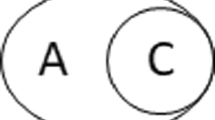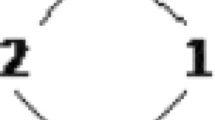Abstract
In the paper we define a generic many valued modal logic, in which modalities are defined in the most general way possible following the idea of Thomason. Both the valuation of formulae and the accessibility predicates — replacing the usual accessibility relations — can be many valued. We present two types of semantics of the logic: the standard (Kripke) one and a relational one. In connection with the latter, we define a special calculus of relations corresponding to the connectives and modalities of the logic, and we develop a complete deduction system in Rasiowa-Sikowski style for this calculus. We illustrate the results by applying our formalisation to the two-valued modalities of possibility and necessity, and to a general class of many-valued modal logics defined by Fitting.
Access this chapter
Tax calculation will be finalised at checkout
Purchases are for personal use only
Preview
Unable to display preview. Download preview PDF.
Similar content being viewed by others
References
Carnielli W. (1987) Systematization of finite many-valued logics through the method of tableaux. Journal of Symbolic Logic 52(2):473–493
Carnielli W. (1991) On sequents and tableaux for many-valued logics. Journal of Non-Classical Logic 8(1):59–76
Fitting M.C. (1992) Many-valued modal logics. Fundamenta Informaticae, 15:235–254
Fitting M.C. (1992a) Many-valued modal logics II. Fundamenta Informaticae, 17:55–73
Frias M., Orlowska E. (1995) A proof system for fork algebras and its applications to reasoning in logics based on intuitionism. Logique et Analyse, 150–151–152:239–284
Frias M., Orlowska E. (1998) Equational reasoning in nonclassical logics. Journal of Applied Non-Classical Logics, 8(1–2):27–66
Konikowska B., Morgan C., Orlowska E. (1998) A relational formalisation of arbitrary many-valued logics. Journal of IGPL, 6(5):755–774
MacCaull W. (1997) Relational proof system for linear and other substructural logics. Logic Journal of the IGPL, 5(5) 673–697
MacCaull W. (1998) Relational semantics and a relational proof theory for full Lambek calculus. Journal of Symbolic Logic, 63:623–637
Morgan Ch., Orlowska E. (1993) Kripke and relational-style semantics and associated tableau proof systems for arbitrary finite valued logics. Proceedings of the Workshop on Theorem Proving with Analytic Tableau and Related Methods, Marseille, France, 179–182
Orlowska E. (1988) Relational interpretation of modal logics. In: Andreka H., Monk D. and Nemeti I. (Eds.) Algebraic Logic. North Holland, Amsterdam, 443–471
Orlowska E. (1992) Relational proof system for relevant logics. Journal of Symbolic Logic 57:1425–1440
Orlowskka, E. (1994) Relational semantics for nonclassical logics: Formulas are relations. In: Wolenski J. (Ed.) Philosophical Logic in Poland. Kluwer, Dordrecht, 167–186
Orlowska, E. (1995) Temporal logics in a relational framework, In: Bolc L. and Szalas A. (Eds.) Time and Logic — a Computational Approach. University College London Press, 249–277
Orlowska, E. (1996) Relational proof systems for modal logics. In: Wansing H. (Ed.) Proof Theory of Modal Logics. Kluwer, Dordrecht, 55–77
Rasiowa H., Sikorski R. (1963) The Mathematics of Metamathematics, PWN, Warsaw
Thomason S.K. (1978) Possible worlds and many truth values. Studia Logica, 37:195–204
Author information
Authors and Affiliations
Editor information
Editors and Affiliations
Rights and permissions
Copyright information
© 2001 Springer-Verlag Berlin Heidelberg
About this chapter
Cite this chapter
Konikowska, B., Orłowska, E. (2001). A Relational Formalisation of a Generic Many—Valued Modal Logic. In: Orłowska, E., Szałas, A. (eds) Relational Methods for Computer Science Applications. Studies in Fuzziness and Soft Computing, vol 65. Physica, Heidelberg. https://doi.org/10.1007/978-3-7908-1828-4_11
Download citation
DOI: https://doi.org/10.1007/978-3-7908-1828-4_11
Publisher Name: Physica, Heidelberg
Print ISBN: 978-3-662-00362-6
Online ISBN: 978-3-7908-1828-4
eBook Packages: Springer Book Archive




